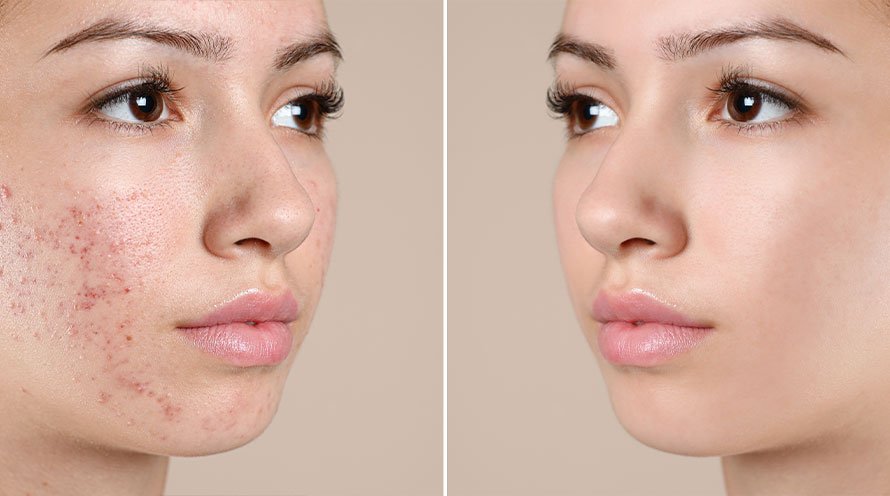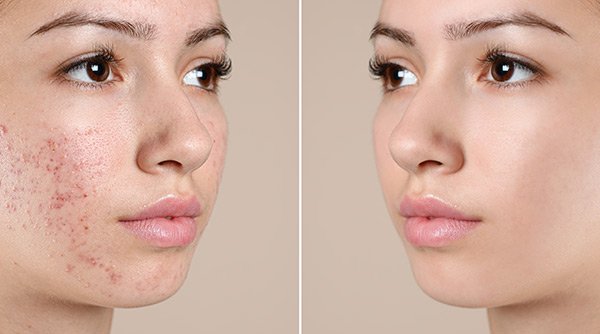Adult Acne: What Works & What Doesn’t
Acne isn’t just a teenage problem—many adults struggle with breakouts well into their 20s, 30s, 40s, and beyond. While adult acne can feel frustrating, the good news is that it’s manageable with the right approach. Understanding the difference between what truly works and what doesn’t is key to achieving clearer skin. From effective treatments and natural remedies to long-term prevention strategies, this guide covers it all. Let’s explore the best solutions for adult acne to help you treat current breakouts and prevent future ones. With the right knowledge and consistent care, you can find reliable solutions for adult acne that actually deliver results
What are some significant treatments for adult acne?
• Update Your Skincare Routine: Revamp your routine with products that target adult skin concerns like dullness, acne, or fine lines.
• Switch to Chemical Exfoliators: Opt for AHAs or BHAs to gently remove dead skin cells and unclog pores without harsh scrubbing.
• Use Sunscreen: Daily SPF protects your skin from premature ageing, pigmentation, and UV-induced damage.
• Double Cleanse Every Night: Start with an oil-based cleanser followed by a gentle face wash to thoroughly remove makeup, sunscreen, and impurities.
• Consume a Balanced Diet: Nutrient-rich foods support healthy, glowing skin from within.
• Manage Stress: Practice stress-reducing habits like yoga, meditation, or regular sleep to help prevent breakouts and skin imbalance.
• Lifestyle Changes: Incorporate healthy habits like regular sleep, hydration, and exercise to support overall skin health and balance.
Effective Treatments for Adult Acne
Adult acne can be triggered by a range of factors such as hormones, stress, diet, and skincare habits. Here are the top solutions for adult acne:
• Update Your Skincare Routine
As we age, our skin evolves, necessitating changes in our skincare routines to address new challenges. Regularly updating your skincare routine is an essential acne solution. Begin by assessing which products to add or remove based on seasonal skin needs. However, avoid making drastic changes all at once. Gradually introduce or swap out products to prevent aggravating your acne.
Start by incorporating a gentle cleanser into your daily routine to ensure your skin is thoroughly cleaned without being stripped of its natural oils. A good tactic is to cleanse twice daily, followed by moisturizing with a hydrating cream. The Vitamin C face wash is a great option for a gentle yet effective cleanse.
• Switch to Chemical Exfoliators
Exfoliation is vital to remove dead skin cells and allow your skin to breathe. While physical exfoliators can be harsh on the skin, leading to sensitivity and potential acne flare-ups, chemical exfoliants offer a mild yet effective alternative.
Chemical exfoliants like AHAs (Alpha Hydroxy Acids) and BHAs (Beta Hydroxy Acids), including glycolic acid, salicylic acid, and vitamin C, work by dissolving the bonds between dead skin cells, unclogging pores, and reducing acne appearance. A lightweight vitamin C face serum or a nourishing hyaluronic acid sheet mask can enhance these benefits, acting as a potent acne solution.
• Use Sunscreen
Sunscreen is a critical component of any skincare routine, particularly in how to get rid of acne. Harmful UVA and UVB rays can cause skin damage, leading to dryness and exacerbating acne. Regular application of invisible sunscreen acts as an acne solution by protecting the skin from sun damage and preventing the onset of painful pimples.
• Double Cleanse Every Night
Preventing acne can be as simple as maintaining good cleansing habits. Double cleansing ensures that all makeup and impurities are adequately removed, reducing the risk of clogged pores that can lead to breakouts. Using vitamin C serum at night can reduce adult acne.
Start with micellar water to wipe away makeup and pollutants gently. Follow up with a gentle cleanser to remove residual dirt, leaving your skin thoroughly clean. Cleanse your face twice daily with a gentle, non-stripping cleanser. This process is particularly effective in resolving adult acne issues and can be complemented with a vitamin C night serum and a night moisturizer for maximum benefits.
• Consume a Balanced Diet
Diet plays a crucial role in how to treat acne, especially when it comes to finding long-term solutions for adult acne. Unhealthy eating habits may spike insulin levels, triggering hormonal imbalances that lead to stubborn breakouts. For more effective solutions for adult acne, it’s essential to work towards a balanced diet rich in leafy greens, fruits, legumes, and protein-rich foods.
These nutrient-dense choices help sustain not just healthy skin, but overall well-being. Remember, treating active breakouts is only part of the journey—incorporating healthy dietary habits is key to preventing future flare-ups and achieving lasting solutions for adult acne.
Sustainable changes to your diet and lifestyle can play a big role in managing adult acne. While food isn’t the sole cause of acne, certain dietary choices may trigger or worsen breakouts. Reducing high-glycaemic foods like white bread, sugary snacks, and processed items can help prevent insulin spikes that often lead to increased oil production.
Limiting the intake of sugary and highly processed foods can mitigate acne triggers, offering another powerful acne solution. Incorporating omega-3 fatty acids, antioxidants, and fiber further supports skin health.
• Manage Stress
Stress is a known contributor to adult acne, as it stimulates oil production and inflammation. Developing stress management techniques such as yoga, meditation, or regular physical activity can reduce stress levels significantly, serving as an indirect acne solution.
• Lifestyle Changes
Making small, consistent lifestyle changes can support your hair health and reduce damage over time. Stay hydrated, eat a balanced diet rich in proteins and vitamins (especially biotin and vitamin E), and try to manage stress through regular exercise or mindfulness practices. Also, avoid over washing your hair and reduce excessive heat styling to prevent dryness and breakage. Even simple steps like switching to a silk pillowcase or using a wide-tooth comb can make a big difference in maintaining your hair’s strength and shine.
Maintaining a consistent skincare routine and avoiding frequent changes in products can help prevent skin irritation and support long-term skin health.
• Pro Tip
Avoid Picking or Touching Your Face this reduces the risk of scarring and infection.
• Home Remedies for Adult Acne
Tea Tree Oil
Known for its antibacterial properties, tea tree oil helps fight acne-causing bacteria and reduce inflammation. Applying a diluted solution directly to affected areas can effectively treat acne and prevent future breakouts.
Aloe Vera
This soothing gel can calm inflamed skin and reduce redness associated with acne.
Apple Cider Vinegar
With its organic acids, it can exfoliate the skin and kill bacteria. Always dilute before applying to the skin.
Honey and Cinnamon Mask
Mix honey’s antibacterial properties with cinnamon’s anti-inflammatory effects for a powerful acne-treating mask.
Adult acne can be frustrating, but with the right approach, it’s absolutely manageable. Focus on consistency, avoid acne-causing food, and follow effective skincare tips to control breakouts. If acne persists, especially on the cheeks or forehead, consult a dermatologist for expert care.
Not sure where to start? Take the Garnier Skin Care Quiz to discover the best skincare products for your skin type and concerns. With Garnier’s range of nourishing, brightening, and acne-fighting skincare products, clearer, healthier skin is just a step away!


